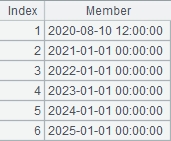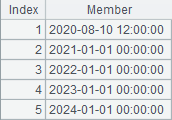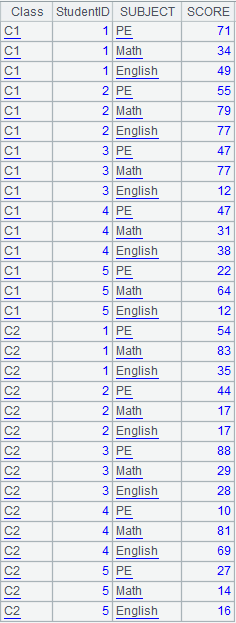periods()
Description:
Generate a sequence of datetime values by specified regular intervals.
Syntax:
periods(s,e,i)
Note:
The function generates a new sequence composed of datetimes in a period from s to e inclusive at a regular interval of i.
Parameter:
|
s |
A datetime variable. |
|
e |
A datetime variable. |
|
i |
An integer indicating the interval; its unit is day and its value is 1 by default. |
Option:
|
@y |
i is the year. |
|
@q |
i is the quarter. |
|
@m |
i is the month. |
|
@t |
i is measured by ten days. |
|
@s |
i is the second. |
|
@x |
Exclusive of the ending point. |
|
@e |
Work with @x option; keep the value of parameter e if it is at the right end of the interval. |
|
@o |
Do not adjust the first datetime value to the beginning point of the time unit. By default, it will be adjusted, and the adjustment is mandatory in the case of using @t. |
Return value:
Sequence
Example:
|
|
A |
|
|
1 |
2000-08-10 12:00:00 |
|
|
2 |
=periods@y(A1,now(),1) |
Set year as the interval unit. |
|
3 |
=periods@yo(A1,now(),1) |
Do not adjust the first datetime; it is adjusted to the beginning point of the time unit by default, and must be adjusted when using @t. |
|
4 |
=periods@q(A1,now(),1) |
Set quarter as the interval unit. |
|
5 |
=periods@m(A1,now(),1) |
Set month as the interval unit. |
|
6 |
=periods@s(A1,now(),7) |
Set second as the interval unit. |
|
7 |
=now() |
|
|
8 |
=pdate@m(A7) |
Get the beginning date of the current month. |
|
9 |
=pdate@me(A7) |
Get the ending date of the current month. |
|
10 |
=elapse(A8,6-day@w(A8)) |
Get the first Friday. |
|
11 |
=periods@x(A10,A9,7) |
Get the sequence of Fridays. |
|
12 |
=A11(2) |
Get the second Friday. |
|
13 |
=A11.m(-1) |
Get the last Friday. |
|
14 |
=A11.len() |
Get the number of Fridays. |
When @e option works:
|
|
A |
|
|
1 |
2020-08-10 12:00:00 |
|
|
2 |
2025-01-01 00:00:00 |
|
|
3 |
=periods@y(A1,A2,1) |
Use @y option to generate a sequence where members are listed by the year:
|
|
4 |
=periods@xy(A1,A2,1) |
Use @x option to exclude the rightmost value:
|
|
5 |
=periods@exy(A1,A2,1) |
Use @ex options to keep the value of parameter e when it is at the right end of the interval:
|


